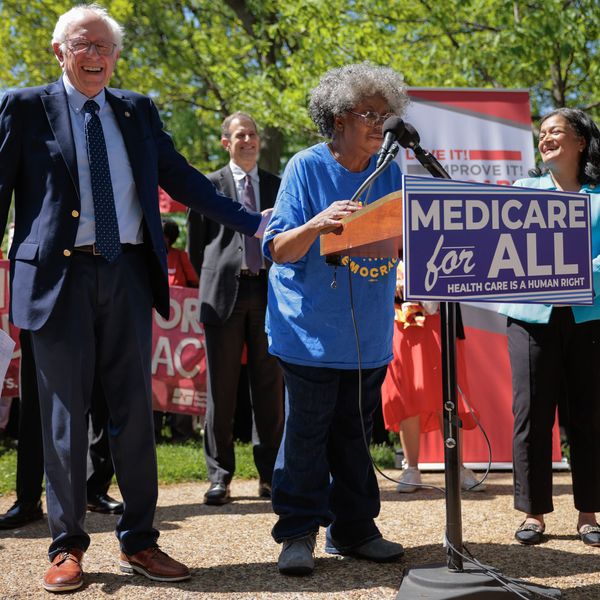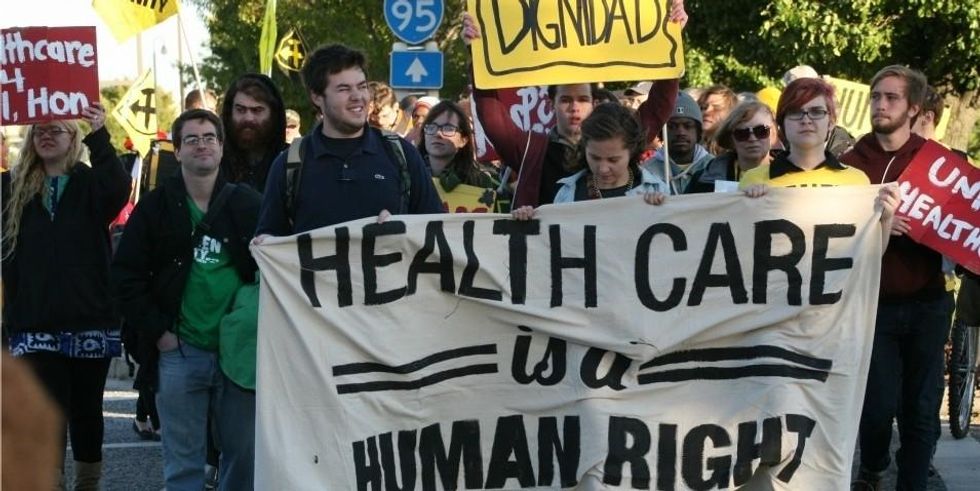The movement to save Medicaid from the Republican chopping block continued on Tuesday, with actions happening on the ground and on social media, just days before the House of Representatives votes on the American Healthcare Act (AHCA), the GOP's answer to the Affordable Healthcare Act (ACA), or Obamacare.
Hundreds of Medicaid supporters held a "die-in" outside of Rep. Darrell Issa's (R-Calif.) office to express concerns that Republicans are angling to gut Medicaid as part of the replacement bill.
"Everyone should have access to affordable health care. My husband is getting out of the Marine Corps and if he doesn't find a job that's a problem for my children and family," one protester told local media. The die-in had been organized by the progressive groups MoveOn.org and Indivisible, the latter of which grew out of the resistance movement to President Donald Trump after his November election.
The president is attempting to amass support for the ACA replacement bill by appealing directly to GOP lawmakers two days before the House votes on the measure, in what is expected to be a major test of Trump's power.
But most eyes are on Rep. Paul Ryan (R-Wis.), who has made no secret of his opposition to Medicaid. On Monday, Ryan and other Republicans unveiled their latest version of the plan, which includes a controversial work requirement for Medicaid recipients.
"We've been dreaming of this since I've been around--since you and I were drinking at a keg," he recently told Rich Lowry, editor of the National Review.
Ali Alhassani, a Massachusetts-based pediatrician, wrote for the medical news website Stat that "crippling Medicaid will only imperil our nation's future prosperity."
Alhassani wrote:
[The AHCA] would freeze any expansion of Medicaid until 2020, and then phase out the expansion completely after 2020. It would also change the funding mechanism of Medicaid to "per capita caps" that would set limits to federal funding over time. Together these changes would reduce federal funding for Medicaid for states by 25 percent, or $880 billion over the next decade. Millions of Americans would become uninsured or underinsured.
[...] As a physician, I know firsthand that there is a lot of waste in our health care system. Many argue that cutting Medicaid would help chip away at this waste by putting financial pressure on state Medicaid programs to be more efficient. But even successful system redesigns have achieved only modest gains in efficiency, not nearly enough to keep up with the funding cuts proposed in the GOP-sponsored plan. States would inevitably have to make hard decisions about cutting Medicaid enrollees, benefits, or both.
"Providing health insurance for children whose parents would otherwise be unable to afford it has been one of the shrewdest long-term investments our government has made. Pulling the rug from underneath millions of our country's children by crippling Medicaid will only imperil our nation's future prosperity," he wrote.
On Twitter, supporters posted messages under the hashtag #SaveMedicaid. Another protest is planned for Wednesday morning in Washington, D.C., with senators joining disability advocates at 11:00am to rally for Medicaid and oppose AHCA.



